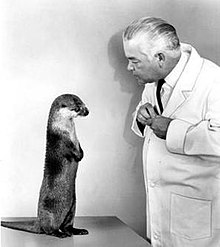Marian Breland Bailey
| Marian Breland Bailey | |
|---|---|
| Born |
December 2, 1920 Minneapolis, Minnesota, United States |
| Died | September 25, 2001 (aged 80) Hot Springs, Arkansas, United States |
| Occupation | psychologist, animal trainer, behavioral scientist |
| Keller Breland | |
|---|---|

Pioneer in humane animal training
|
|
| Born |
March 26, 1915 Poplarville, Mississippi |
| Died | June 17, 1965 (aged 50) Hot Springs, Arkansas |
Marian Breland Bailey, born Marian Ruth Kruse (December 2, 1920 – September 25, 2001) and nicknamed "Mouse", was an American psychologist, an applied behavior analyst who played a major role in developing empirically validated and humane animal training methods and in promoting their widespread implementation. She and her first husband, Keller Breland (1915–1965), studied at the University of Minnesota under behaviorist B. F. Skinner and became "the first applied animal psychologists."
Born to Christian and Harriet (Prime) Kruse, Marian Ruth Kruse grew up in Minneapolis, Minnesota. German-born Christian worked for an automotive supply store, and Harriet was a registered nurse. Marian's father and then others called her "Maus" ("mouse"), a common German nickname for little girls. After graduating from Washburn High School as her senior class's valedictorian, Marian Kruse went to the University of Minnesota to major in Latin and minor in Greek. Although financial times were difficult as her family had lost everything during the banking collapse of the Great Depression, a full scholarship and a Works Progress Administration award for writers supported her undergraduate education. Before long, she also became a research assistant for B. F. (Fred) Skinner.
To meet a science requirement, Marian took psychology because, as she later explained, "I thought it the least painful science." As a straight A student, she was recommended for a highly selective psychology class taught by Skinner (the first of what Skinner later called "pro-seminars"), under whom she studied along with George Collier, W. K. Estes, Norman Guttman, Kenneth MacCorquodale, Paul Everett Meehl, and others bound for later fame in their field. With its emphasis on Skinner's new operant training techniques, the course inspired Marian to major in psychology with a minor in child psychology and to study operant conditioning.
...
Wikipedia
